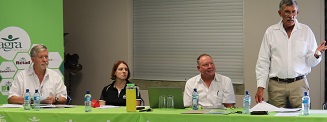
Quality and price go rural

Haufiku Mathias, a mechanic at Ongwediva Rural Development Centre. (Photograph by Hilma Hashange)
Whollyowned by the government, the Ongwediva Rural Development Centre is managed by Non Governmental Organisations (NGO’s). The centre is currently managed by Ngoma Consulting Services. Technicians at the centre design and manufacture machinery and equipments which help to advance food production, food preparation, safe water provision and sanitation.
These products are mainly used by communal farmers and include animal troughs, concrete rings used as a lining for improved wells to provide safe drinking water, bush pumps, Mahangu threshers, hammer mills, ventilated pit latrines and Marula juice pressers, amongst others.
According to Jakobina Nghilokua, Marketing Manger of the centre, prices of these are set at an affordable rate to cater to the biggest clients who mainly comprise pensioners and communal farmers. “Customers come from as far as Zambezi region, we even sold two tractors to that region in 2012. These products can help to reduce poverty, improve the standard of living and boost income generation in rural areas,” said Nghilokua.
She added that the centre also undertakes repairs of malfunctioning products. It is an importer of walking tractors from China which are then assembled at the centre and modified by fitting other parts on them such as trailers and pumps.
Ongwediva Rural Development Centre also boasts a guest house which offers affordable accommodation and catering services to the nearby communities. A private gym, a restaurant, bar facilities and conference rooms are also available to guests.
The centre offers job attachments to students from vocation training centres in welding, boiler making and mechanical repairs and has a Research and Development department that offers training to farmers.
The centre has a department that deals with the testing of viable natural products and the best approach for projects, production and processing methods to help improve food security and create income generating opportunities for the community.
“The Community Development officer as well as the Natural Resources technician offer their expertise and knowledge through training to the community to improve farming, food production techniques, training and income generating activities,” said Nghilokua.
According to the manager, the centre aims to deliver training and support courses on food processing and preservation and in future plans on collaborating with other organisations to deliver a concentrated programme of assistance, skills training and projects to introduce sustainable food production for those who have none as well as improve agricultural production with training, trials and projects.













































